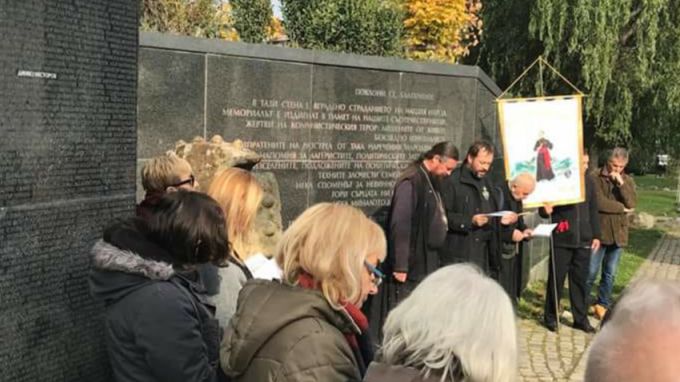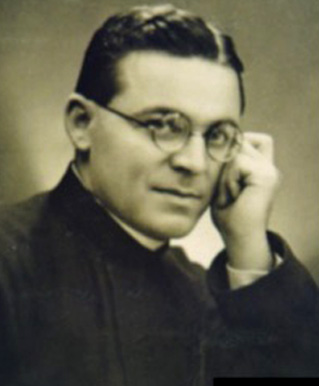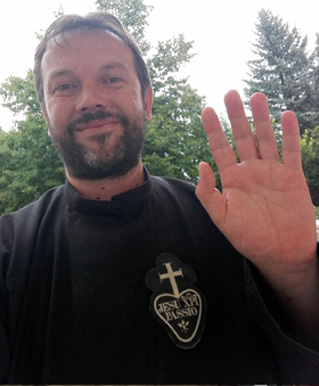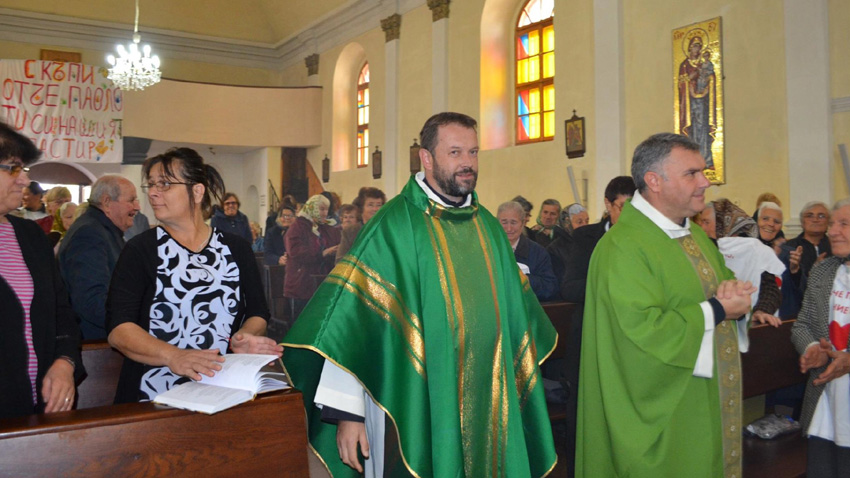
 On November 11, 1952 at 22.30 in the courtyard of the Sofia Central Prison four Catholic priests were shot dead. Instead of signing the protocols in the political show trial against them, Bishop Eugene Bosilkov and priests Kamen Vitchev, Pavel Dzhidzhov and Yosaphat Shishkov chose martyr's death in the name of faith. And since the regime was interested in wiping out the memory of these people, their murder was wrapped in silence until 1975, when communist leader Todor Zhivkov personally recognized the crime before Pope Paul VI in the Vatican. However, the church did not forget its martyrs, and Pope John Paul II proclaimed them blessed.
On November 11, 1952 at 22.30 in the courtyard of the Sofia Central Prison four Catholic priests were shot dead. Instead of signing the protocols in the political show trial against them, Bishop Eugene Bosilkov and priests Kamen Vitchev, Pavel Dzhidzhov and Yosaphat Shishkov chose martyr's death in the name of faith. And since the regime was interested in wiping out the memory of these people, their murder was wrapped in silence until 1975, when communist leader Todor Zhivkov personally recognized the crime before Pope Paul VI in the Vatican. However, the church did not forget its martyrs, and Pope John Paul II proclaimed them blessed.
The Catholic community in Belene, led by Father Paolo Cortezi, organized a national pilgrimage at the end of last week on the occasion of the 65th anniversary of the sacrifice of the four priests with liturgy in the St. Joseph Cathedral. Wreaths were placed at the Sofia Central Cemetery, as the graves of the martyrs remain unknown to this day. Flowers and wreaths were also placed at the Memorial of the Victims of Communism in the capital city. "We honor them and before being saints to us, the Catholics, they are good sons of Bulgaria, bright people, enlighteners of the nation who lived in faith and were doing good deeds," Father Paolo Cortezi said.
Eugene Bosilkov was born in 1900. He was baptized on the day of his birth. One day while playing on the banks of the Danube he fell into the river and the water swallowed the child. He was miraculously saved when his mother asked the Mother of God for help and vowed that her son would be in service of Christ's church. That is how when he was eleven years old he joined the Catholic Seminary of the Passionists in the village of Oresh, and a few years later he was sent to Belgium, the Netherlands and Italy. After ten years of hard training abroad he returned to his home country in 1926 to become a priest.
 "This man from Belene received European education and spoke 11 languages," Father Paolo Cortezi says. "He gives us an example that we should not stop learning and reading. Moreover, blessed Eugene Bosilkov and the other martyrs were truly devoted priests. They encourage us to believe in God, because life is not just material. The third important thing is love for people - Eugene Bosilkov served for 13 years in the village of Bardarski Geran, where he cared for the poor and the youth. We can also provide valuable gifts to the younger generations: faith, education, and desire for doing good deeds.”
"This man from Belene received European education and spoke 11 languages," Father Paolo Cortezi says. "He gives us an example that we should not stop learning and reading. Moreover, blessed Eugene Bosilkov and the other martyrs were truly devoted priests. They encourage us to believe in God, because life is not just material. The third important thing is love for people - Eugene Bosilkov served for 13 years in the village of Bardarski Geran, where he cared for the poor and the youth. We can also provide valuable gifts to the younger generations: faith, education, and desire for doing good deeds.”
In 1947, Pope Pius appointed Eugene Bosilkov as a bishop of the Nikopol Diocese and in the meantime, his dossier in the Bulgarian State Security reached 8,000 pages. Georgi Dimitrov called him and two other senior clergy members to order them to break up with the Catholic Church in Rome. When they firmly refused, persecutions, arrests, satanic tortures, and murders followed.
“If anyone would come after me, let him deny himself and take up his cross,” Jesus Christ said. While their lives are no longer endangered, priests today also confront hatred and misunderstanding. Because of providing shelter to a family of Syrian refugees in Belene, Father Paolo Cortezi faced aggression of nationalists and was forced to leave Bulgaria.

"This gesture of charity was made not by me, but by the local Catholic community," the priest who recently returned to the country said. "And I'm surprised how a good, lawful deed can awaken such hatred. These refugees were modest people and everything linked to them was coordinated with the State Agency for Refugees and the Caritas charity organization. I had never seen such a thing before and I hope it would not be repeated. I wish everyone who wants to do good, to be brave and obey the laws, the gospel and human values, because we are obliged to love and help not only in words but also in our deeds. Our community will continue trying to help people in need without borders, the way we help many Bulgarians, gypsies, refugees… By the way, half of the people of Belene are also migrants all over the world because there are no jobs here, and I hope people will accept them and help them."
English: Alexander Markov
Photos: private libraryThe Patriarchal Cathedral of St Alexander Nevsky is celebrating its temple feast today. The cathedral, a symbol of the Bulgarian capital, was built "in gratitude to the Russian people for the liberation of Bulgaria from Ottoman rule in 1878". Who..
On November 22 and 23, the Bulgarian Orthodox Church will solemnly celebrate the 100th anniversary of the consecration of the Patriarchal Cathedral "St. Alexander Nevsky" . For a century the cathedral has been "a witness to all the hopes and..
The Feast of the Epiphany - the entry of the Theotokos into the Temple - is one of the oldest and most revered feasts in the Orthodox world. It was introduced in Constantinople around the 8th century during the time of Patriarch Tarasius. It was six..
In anticipation of the Nativity of Christ, the Orthodox Church opens its doors for today's divine services, heralding the fulfillment of the mystery of..
At sunset on December 25, the Jewish community begins to celebrate Hanukkah. The holiday begins on the 25th day of the Jewish month of Kislev in the..
The Bulgarian Orthodox Church celebrates Christmas with solemn services. The festive services began on Christmas Eve, when the church held a solemn..

+359 2 9336 661
